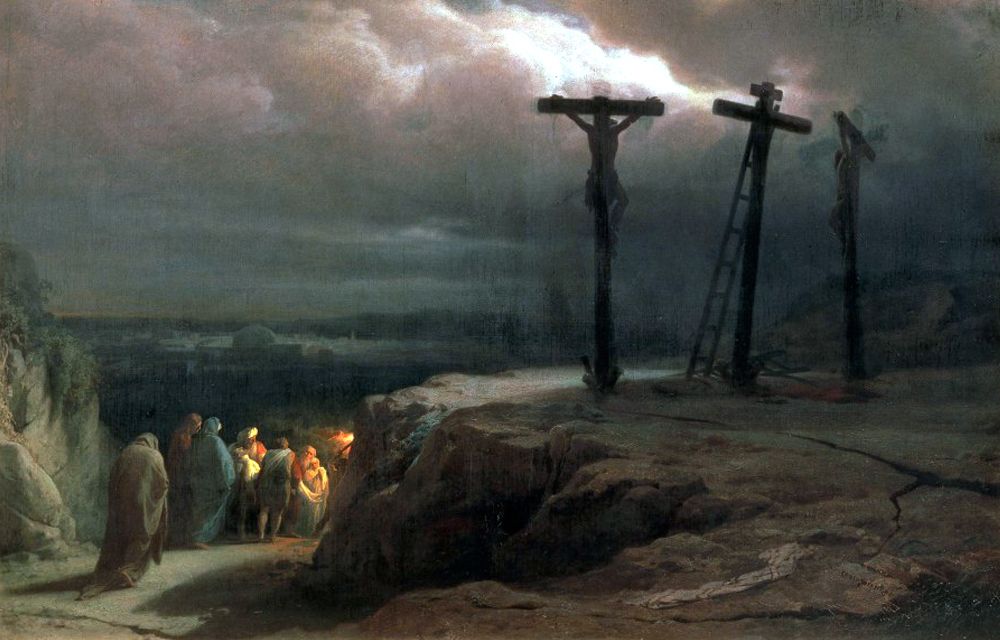|
We need to de-sanitize Golgotha. By this, I do not mean we need more R-rated visual renderings of the crucifixion narrative (Mel Gibson’s vision is beyond sufficient). Neither do I mean we need more emotional sermonetting of the brutality of Christ’s physical torture and execution (though this is a worthy venture). Nor do I mean we need new cutting-edge scientific and historical documentaries verifying the accuracy of the Passion narratives (though this too is a worthwhile endeavor). Rather by this I mean we need to recover our place in all the hellish bloody cosmic messiness that occurred at Golgotha.
We conveniently (consciously or unconsciously) tend to “sanitize Golgotha” in our minds and hearts when Easter rolls around. We tend to place ourselves in the narrative of the Passion as passive onlookers witnessing from afar what the ominous “they” did to our Jesus that day. We are reminded through song, sermon, and drama of the brutality exacted towards “our” Jesus by the hands of tradition, religion, hate, and power. Tears roll down our faces, the emotions are stirred, and our faces are flushed. BUT THEN the songs fade and the sermon is over. As quick as the image came it dissipates, we shake ourselves and move on. We get back to our daily. We get back to fighting with our spouses and yelling at our kids. We get back to our insecurity, our gossip, lust, greed, envy, pride, and apathy. So, just like going to watch a movie in the theater, we are changed in the moment but afterward go out to find something else to do. Is there really no difference existentially between our responses to a movie and the message of the cross? Surely there is more? Do not misunderstand. I am not saying there is no place for us to reflect upon the brutality of the crucifixion or that we are wrong if we have emotional responses to the history of it. In fact, to fail to have emotion in the face of the cross is to fail to have a soul. But that said, what I am challenging and questioning is how we ritualistically go about our reflections and remembrances of Calvary. You must ask, I must ask, has its true message gone deep enough? We are moved by it, it jerks our heart, but does it really, categorically, transform us? I do not presume to have all the answers and I do not want you to go away from this post thinking there is any form of “ivory tower judgmental preachy wisdom” coming from this author. There is a genuine conviction of thought and reflection in what is posted. Without going into a long dissertation, I want to propose that for us to recover the true gritty nature of Golgotha, for it to have a real penetrating and lasting effect for our lives beyond Easter Sunday, it requires at least (but not limited to) a reworking of how we process its message in our hearts and minds on the daily. Golgotha needs to become more than a tourist attraction we visit once a year on Easter Sunday. It needs to become the ever-present witness to just how serious sin is in our daily lives and just how profound God’s love is in those moments. We need to recover OUR PLACE and OUR SIN at Golgotha so that it becomes a living, breathing, memorial that awakens us to be what it achieved – to be a people who do not shrug at sin but crucify it, to be a people who love at the expense of themselves, to be a people whose identity, meaning, hope, and purpose is restored to the intended ends of God’s glory instead of self. ADMIT THAT YOU DROVE THE NAILS As I said earlier, we tend to stand as passive onlookers to the crucifixion story. We cry and rage at what “they” did to Him. The problem is there is no “they,” there is only “we.” There is no room for stagnant spectators at the cross. Everyone was actively participating. The masses of Jews and Romans were beating and butchering Christ physically as much as you and I did spiritually. You were at Golgotha and so was I. We all were. The Romans alone didn’t put Jesus on the cross. The Pharisees alone didn’t put Jesus on the cross. Pilate alone didn’t put Jesus on the cross. Caiaphas alone didn’t put Jesus on the cross. You did. I did. We all did. Our sins did. Chew on that. Let it sink in. Dwell on it a while. No, dwell on it a long while. All the soiled sins of the world were affixed to His blinding purity. All the little ones, all the big ones, all the ones you shrug off, all the ones you exact towards family and friend, all the ones you fear others to know, all the ones you still battle with, all the ones you struggle to let go. Every day when you slip back into the old self and allow sin to rear its ugly head, be reminded, that those sins, with myriads of others, are the ones seared onto the bruised body and being of the Infinitely Innocent One. All of them were put onto Him so much so that there was no epistemic distance humanly discernable between His being and sin. Putting this all into biblical language the Apostle Paul put it like this, God made Christ who had no sin to be sin for us, so that in him we might become the righteousness of God. 2 Corinthians 5:21 Did you really read this? Do you get this? Do you feel this? The whole reason, the central driving meaning behind Christ BEING SIN was…FOR US. It is about us. Because sin is personal Golgotha is personal. Golgotha was logically, biblically, unquestionably because of us AND beautifully, gracefully, undeniably for us. The great theologian John Stott (1921-2011) put it like this, “Before we can begin to see the cross as something done for us, we have to see it as something done by us.”[1] It is a totally different thing when you intentionally remind yourself that the only nails that really kept Christ on the cross were the ones you use on your loved ones and neighbors many times on many different days of the week. When you nail them with pinpricks, backbiting, gossip, lust, envy, pride, and the whole slew of 1 Corinthian 6 vices, you actualize in your life the things for which Christ was eaten alive. He died because of those things and for those things to lose their power of keeping distance between you and the Holy One. THE TERROR, JOY, & BEAUTY OF GOLGOTHA Despite all the bruising and infinite weight of demonic distress upon Him, Christ still died for us. There is horror and sweetness in this. He died for our daily sins. Think on this for a moment. How insane it is to the human mind to willingly be ripped apart by a people who shrug at Your grace and purity. Yet, in such insanity there resides unbounded sobriety and beauty. In the face of the vileness of Golgotha, we are also met with the Face of unshakably Love. In the wake of entering Jerusalem with throngs of half-baked worshipers Jesus prayed with anguish to the Father for such a time to pass from Him, and yet without losing a breath said, “For this purpose, I have come to this hour” John 12:27 Golgotha was His purpose. Golgotha penetrated everything He thought and did. It was there at the manger, it was there at the Sermon on the Mount, it was there at the Mount of Olives, it was there at the breaking of the fish and loaves, and it was there at the triumphal entry. It was at Golgotha that Jesus’ purpose would be and was actualized into space and time and for all eternity. And yet with such horror ever-present to Jesus’ mind's eye all His days, the author of Hebrews says, For the joy set before Him, he endured the cross, scorning its shame… Hebrews 12:2 The cross was set before Him. That is, it was always His end goal, His telos, His purpose. And yet He had joy? The words “joy” and “cross” do not go together in any humanly conscionable way. But in and with Christ they do. Such a joyous agent as Jesus did what no other merely human agent could possibly achieve: turning the image of the cross from a symbol of maximal derision and vileness into the symbol of infinite grace and a new identity. In a real sense, joy conquered the shame of the cross and overtook it. This is why strangely we Christians can and do need to possess a robust balance between glory and humility when we behold the cross on Golgotha. The terror of Golgotha that we need to ever keep in our minds is that it was because of us, yet the glory and joy of Golgotha reside in the fact that it was for us. John Stott powerful put it this way, “The essence of sin is man substitution himself for God, while the essence of salvation is God substituting himself for man. Man asserts himself against God and puts himself where only God deserves to be; God sacrifices himself for man and puts himself where only man deserves to be.”[2] The infinity of heavenly-wrath and holy-love crashed upon one another in a moment of space and time on Golgotha. It was in that moment that all our daily sins were vanquished of their potency and chains. This is why we can sing in ecstasy to the degree we mourn in travail over the events that transpired on the Place of the Skull. May we never forget and readily retain the power of what happened on Golgotha. O Golgotha! Good Golgotha! My Lord was slain for me; His precious blood in mercy flowed That I from sins be free. Therefore I pray, my Lord, reveal Golgotha’s mystery, So I may know that I am one With Thee in certainty. O Golgotha! I praise Thee, Lord, For death was suffered there; Released His life, redeemed my sins, I’m freed into His care. O Golgotha! I want to learn All that indwells in Him; By faith included in His work, I’ll stand now firm with Him.[3] _________________________ [1] John Stott, The Cross of Christ (Downers Grove, IL: InterVarsity Press, 2021), pg. 63 [2] Stott, pg. 159 [3] Difficult finding the origin of this hymn, but it seems to be an old early 20th Century Chinese Christian hymn, most likely written by Watchman Nee. Source found in Watchman Nee, Collected Works of Watchman Nee, Vol. 23, The Song of Songs & Hymns (N.p.: Living Stream Ministry, 1993), pg. 174-175
0 Comments
Leave a Reply. |
AuthorMichael H. Erskine is a high school Social Studies Teacher, has an M.A. in History & School Administration, serves as a Bible teacher in the local church, and is happily married to his beautiful wife Amanda. aRCHIVES
November 2022
Categories
All
|


 RSS Feed
RSS Feed
